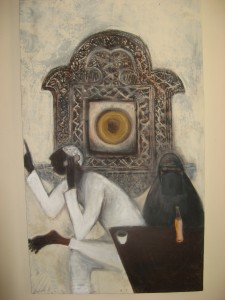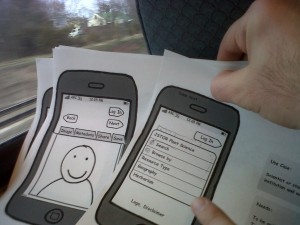Thanks all for your patience, understanding, patience, and feedback. This is all starting to take shape and a few of you have pointed me further down specific lines of inquiry that I was only giving some cursory attention to, so many thanks.
In this post, I am trying to link the previously discussed disciplinary practices of History with mobile learning frameworks and theory as well as to perform a cursory link from mobile learning to international development consistent with the higher education needs of East Africa (Tanzania specifically, most likely the area of focus). So, those assumptions and questions will come up again, the ones specifically dealing with SMS-based mobile environments as a prerequisite as well as can these disciplinary practices of History (which are certainly biased/established in developed nations’ systems of education) be ported into a developing sphere. Other questions/assumptions/notes I have from this section are:
- Mentioning repeatedly ‘expert level systems’- this is my codeword for disciplinary practice primarily at a graduate or faculty level. In short practitioners of History rather than merely students of it.
- I dumped parts I had in there about augmented reality (regardless of what it does for historical practice) as that is completely unrealistic in terms of East African mobile penetration right now. Although Kenya has introduced a modestly priced smartphone, we are years away from seeing smartphone penetration and bandwidth/networks capable of saturating communities of practice (History).
- I am realizing more and more that the solution I can loosely envision, of creating a dialogue based community of practice (History in higher education in Tanzania), might require a small build. I think my future will involve at some point learning how to configure Frontline SMS.
- How exactly can I use the work of Sharples, Taylor, and Vavoula (2007) as a framework for assessment of the efficiency of whatever solution is constructed from this research? Merely by seeing that it fulfills the “affordance for mobility, identification of learning as a constructive and social process, and the role of situated activity mediated by technology”?
- Anyone know of more Humanities-based experimentation in mobile learning occurring in higher education in Africa? I know of many (many) examples for medicial/agricultural/technological networks, but none for Humanities-based practice.
Mobility and Mobile Learning
“Towards a Theory of Mobile Learning” provides a useful mediation between learning and technology and will be used to analyze mobile learning for History (Sharples, 2005). Sharples builds on the work of Pask (Conversation Theory) and Engestrom (expansive activity model) by establishing the technological layer of mobile learning, which represents learning as an engagement with technology, “in which tools such as computers and mobile phones function as interactive agents in the process of coming to know, creating a human-technology system to communicate, to mediate agreements between learners and to aid recall and reflection” (Sharples, 2005, 7). The ability of mobile learning to facilitate understanding, mediate knowledge, and aid in reflection constitutes an intersect between mobile as technology and History as a community of practice.
Further, the work of Sharples, Taylor, and Vavoula offers insight into an evaluation of any potential mobile learning solution for expert level systems in these fields, an additional framework that can be applied to this research (2007). This work posits mobile learning in terms of its affordance for mobility, its identification of learning as a constructive and social process, and the role of situated activity mediated by technology (Sharples, Taylor, Vavoula, 2007, 225). Any potential mobile learning solution derived from this research into History will be gauged based on its ability to satisfy these facets of mobile learning. Sharples’ work will be used as an instrument to determine whether mobile learning for History creates control (both the community of learners and their association with higher education), context (in terms of the learning activities and objects) and communication (in mobile learning’s ability to allow for communication both within the learning community and the ability to disseminate communication to the greater academic community).
Adjacent to this analysis of context in mobile learning will be activity theory, the mediation of knowledge through tools, technology, and language. Mobile learning is especially suited to activity theory due to its focus on context and that learning objectives can be met through multiple contextual structures (Wali, Winters, Oliver, 2008, 46). Mobile learning demands flexibility in contextual approach, a flexibility well suited to activity theory. The potential of mobile learning applications to support learning in History will be examined in keeping with these pedagogical and technological frameworks. These frameworks for evaluating mobile learning will be specifically targeted towards their view of mobility itself as an active agent in constructing knowledge, as well as to their ability to satisfy the disciplinary processes of learning and knowledge construction in History in higher education.
Mobile Learning and Development
Mobile learning offers nations classified as developing the opportunity to leapfrog a technological cycle by foregoing upgrading from a current computer based infrastructure of communications. This leapfrogging process opens opportunities for developing nations to bypass stages of “technology development and to stimulate social and economic development” (Davison, Vogel, Harris, Jones, 2000). As the ICT of greatest penetration in both the developed and developing world, mobile offers the greatest advantage in terms of leapfrogging a technological cycle. While the need for computing infrastructure still remains, it is mitigated by the appearance of mobile technology to lessen the digital access gap experienced in many developing nations.
Further to this technological penetration are the cultural elements of adoption. There are several instances of informal mobile learning communities appearing in developing nations related to agricultural, economic, medical conditions that establishes a cultural antecedent for a more systematic approach in higher education towards expert level practice. These generally involve informal learning communities engaging for the purposes of knowledge management and dissemination. Generally, these mobile learning networks rely on data collection and dissemination, the same type of functionality required of many of the field sciences towards achieving their disciplinary goals of systematic identification and classification of biodiversity. Mobile learning for their liberal arts counterparts in higher education have few conceptual bridges in informal learning networks, something this research will attempt to address.
To move beyond mere data collection and dissemination and towards reflective and collaborative knowledge creation in these non-scientific disciplines will require an adherence to the pedagogical approaches found in constructivist learning, (Tetard, 2008) originating from the seminal work of Piaget (1982; Piaget and Inhälder 1975) and Vygotsky (1969) (Tetard, 2008). In this pedagogical approach, it is understood that knowledge is created through the interactions of experiences and ideas. This approach is well suited to mobile learning because mobile learning allows for experience-based learning in situ, an analysis of the object in learning in the context of the object itself. Context in formal mobile learning environments is a mediation between the agents involved. In short, the context is formed by the interplay of the tools (technology) employed, the tasks designed through institutional control, the community of practice (History), the location and level of expertise of the learner, and their proximity to the subject of learning itself. Higher education, in this sphere, can provide community, tools, and context.
By way of an example, university level students can use mobile devices to analyze cultural heritage sites on site. With mobile learning applications, they can record data, disseminate this data within their learning community, ground theories in collected data, debate theory, reflect, and disseminate reflected analysis all from their mobile devices, all within eyesight of the object under investigation. This constructivist approach marries the ideas and the experience and offers great potential for linking non-scientific disciplines with dynamic forms of communication and community, community unencumbered by geographical or technological limitations. The design guidelines for mobile learning objects and mobile learning in general are borrowed from Patokorpi et al. (2007), which by the way is in accord with the general constructivist learning theory.




[…] Part 4: MLearning Theory […]
[…] Part 4: MLearning Theory […]